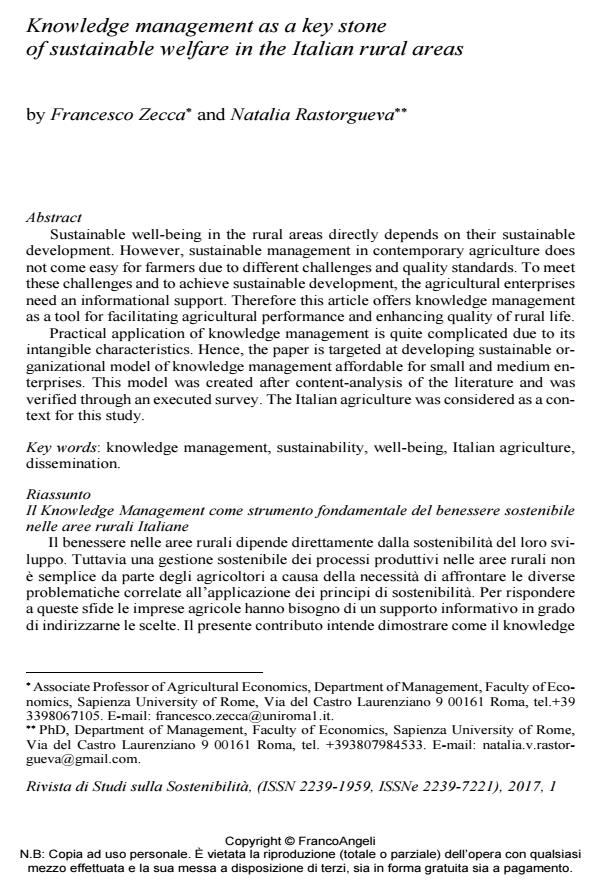Knowledge management as a key stone of sustainable welfare in the Italian rural areas
Titolo Rivista RIVISTA DI STUDI SULLA SOSTENIBILITA'
Autori/Curatori Francesco Zecca, Natalia Rastorgueva
Anno di pubblicazione 2017 Fascicolo 2017/1
Lingua Inglese Numero pagine 19 P. 183-201 Dimensione file 242 KB
DOI 10.3280/RISS2017-001012
Il DOI è il codice a barre della proprietà intellettuale: per saperne di più
clicca qui
Qui sotto puoi vedere in anteprima la prima pagina di questo articolo.
Se questo articolo ti interessa, lo puoi acquistare (e scaricare in formato pdf) seguendo le facili indicazioni per acquistare il download credit. Acquista Download Credits per scaricare questo Articolo in formato PDF

FrancoAngeli è membro della Publishers International Linking Association, Inc (PILA), associazione indipendente e non profit per facilitare (attraverso i servizi tecnologici implementati da CrossRef.org) l’accesso degli studiosi ai contenuti digitali nelle pubblicazioni professionali e scientifiche.
Sustainable well-being in the rural areas directly depends on their sustainable development. However, sustainable management in contemporary agriculture does not come easy for farmers due to different challenges and quality standards. To meet these challenges and to achieve sustainable development, the agricultural enterprises need an informational support. Therefore this article offers knowledge management as a tool for facilitating agricultural performance and enhancing quality of rural life. Practical application of knowledge management is quite complicated due to its intangible characteristics. Hence, the paper is targeted at developing sustainable organizational model of knowledge management affordable for small and medium enterprises. This model was created after contentanalysis of the literature and was verified through an executed survey. The Italian agriculture was considered as a context for this study.
Il benessere nelle aree rurali dipende direttamente dalla sostenibilità del loro sviluppo. Tuttavia una gestione sostenibile dei processi produttivi nelle aree rurali non è semplice da parte degli agricoltori a causa della necessità di affrontare le di-verse problematiche correlate all’applicazione dei principi di sostenibilità. Per rispondere a queste sfide le imprese agricole hanno bisogno di un supporto informativo in grado di indirizzarne le scelte. Il presente contributo intende dimostrare come il knowledge management può favorire la sostenibilità nelle aree rurali migliorandone la qualità della vita. Lo sviluppo del modello ha avuto come riferimento dimensionale le piccole e medie imprese. Il modello è stato messo a punto attraverso l’analisi della letteratu-ra ed una verifica empirica condotta attraverso la somministrazione di un questionario. Come contesto relazionale è stato preso a riferimento il settore agricolo Italiano.
Parole chiave:Knowledge management, sostenibilità, benessere, agricoltura italiana, disseminazione.
- Sustainable Agriculture Management: Environmental, Economic and Social Conjunctures for Coffee Sector in Guerrero, via Traditional Knowledge Management David Israel Contreras-Medina, Luis Miguel Contreras-Medina, Verónica Cerroblanco-Vázquez, in Sustainability /2024 pp.6864
DOI: 10.3390/su16166864
Francesco Zecca, Natalia Rastorgueva, Knowledge management as a key stone of sustainable welfare in the Italian rural areas in "RIVISTA DI STUDI SULLA SOSTENIBILITA'" 1/2017, pp 183-201, DOI: 10.3280/RISS2017-001012